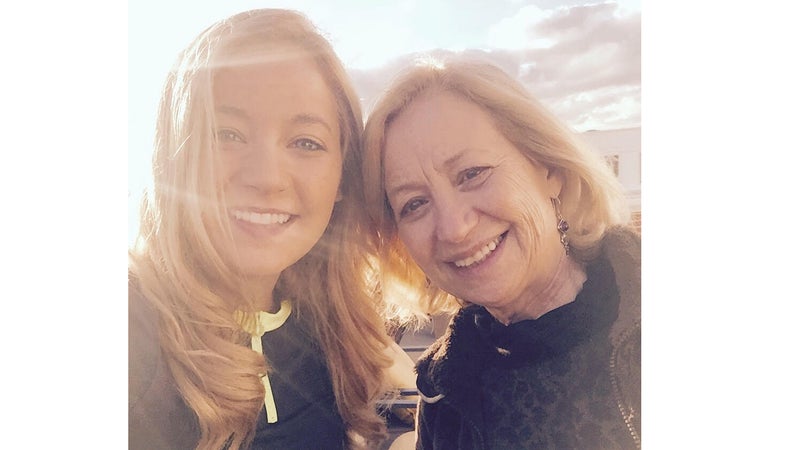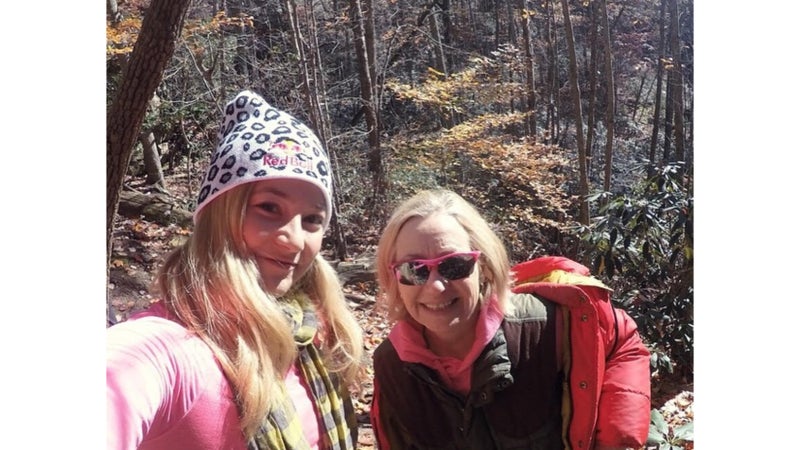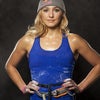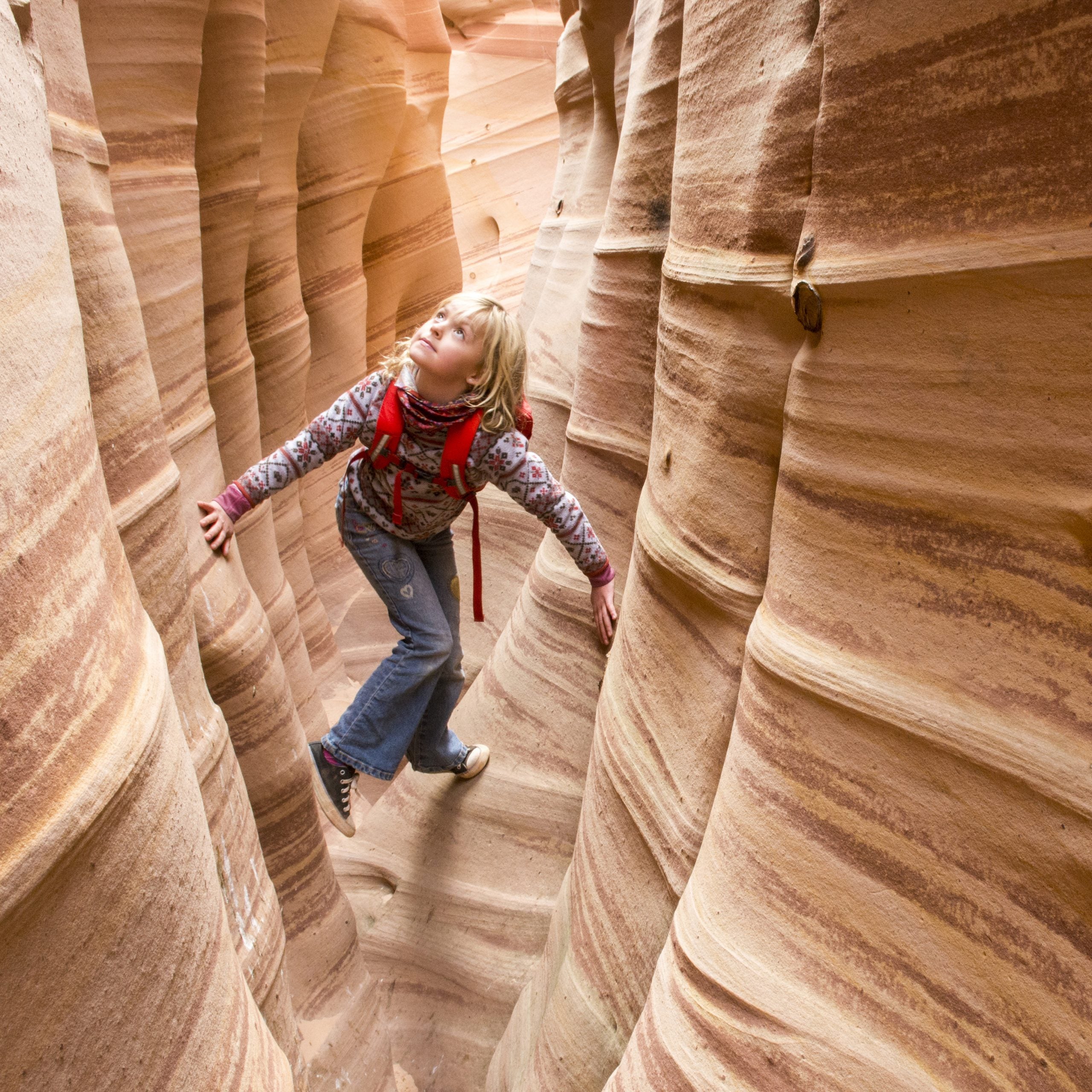“Every time I hear about what Sasha does, I think, ‘I’m so glad that’s not my daughter!’” I overheard a woman say this to my mom at a holiday party last December. The woman was referring to the fact that I’m a professional climber. My mom, Andrea, later told me that she often gets this type of response from other mothers when she mentions what I do for a living.
I guess that perspective makes sense. On the surface, climbing seems pretty dangerous. The reality, of course, is that there are ways to calculate and reduce risk if you know what you’re doing. The odds of a fatal climbing accident are relatively low. But a lot of people don’t know that. My mom certainly didn’t know that back in 1998, when she hosted my brother’s birthday party at a local climbing gym in our hometown of Alexandria, Virginia. That was my first climbing experience—the event that set me on a trajectory to make the sport my life.
As an outdoor enthusiast, my mom was always aware of rock climbing, but she never knew any climbers personally before I started doing it. I began traveling to competitions and pushing my limits on walls indoors before climbing gyms and youth clubs were as popular as they are now, and it forced my mom to confront the risks. “Charlie [my brother] played hockey and football. I watched him wrestle and swing a stick on the lacrosse field,” my mom says. “All of those sports involve injury and danger, and yet that danger is acceptable because they’re pro sports, whereas the danger in climbing is less understood.”
As I’ve tackled bigger trips outside as an adult, my mom and I talk about climbing in a different way. Here’s an edited transcript of a recent conversation we had about raising a daughter in an unfamiliar, risky adventure sport and how she handles people who question her choices.

SASHA: Do you remember when I first went climbing outside?
ANDREA: Your first outdoor experiences were at , north of Montreal, and then following that with your coach, Claudiu Vidulescu. Then the competitions. You were young, and it was such a wonderful environment and such a caring group of people who were watching out after everyone. I couldn’t help but be inspired.
What was wonderful about it?
The cooperation and the joy people were expressing and how they were all getting together, rooting everybody on, and giving beta. They were just so welcoming. By and large, everyone was cooperative, as opposed to the competition you see with hockey and soccer and swimming—every other sport was a big competition. Climbing was a competition, but people were cooperating. They were competing against themselves as opposed to competing against others.
There was no tipping the scale, like how hockey coaches choose their favorite players to go on the ice. It was completely objective. Plus, it was outside. It was about enjoying nature. To me, that’s how sports should be.
When I was 12, I started going on outdoor climbing trips and competing. How did the other parents at Potomac (my school from kindergarten through 12th grade) view me, and what did they say to you?
I caught a lot of blowback for allowing you to do so much on your own, because while everyone else was checking their children’s curfews, I had you on “find-a-friend.” People were astonished that I allowed you to go out on your own. But I always trusted you, and I knew that if you were on a climbing trip, you weren’t going to be sneaking beers or vodka in water bottles. You were going to be doing a sport, and I trusted your coach, Claudiu.
Did you ever hear other parents say, “How can you let her do that? It’s so dangerous!”
All the time.
What did you think about that?
I just didn’t see climbing as any more dangerous than other sports. It was so controlled and focused, and I saw the growth in your self-confidence, in your joy. It was stimulating you as a person. I never saw a negative.
How do you think climbing helped me grow as a person?
You were very quiet, very shy before climbing. You were not as outgoing as your older brother Charlie by any means. But through climbing, you gained a tremendous self-sense and self-awareness, and you started to blossom as a person. You had wonderful teammates as role models. Everyone on your climbing team, in my opinion, was responsible, caring, and smart. Everyone was doing their homework. Even if you took off three days to go climb, you came back ahead of the class rather than behind.
So, I was going to junior team practice with other kids and Claudiu, but how did you end up belaying me at the gym?
The first reason that I started to belay you was because Claudiu told me I had to. Eva [an Olympic gymnast and mother of two kids on the team] was belaying her kids. Isaac’s [another boy on the team] mother was belaying him. Claudiu had the parents involved from the very beginning, and he told me I had to do it.
Then, when you started lead climbing, I took the course so I could lead belay, and honestly, I loved it. I loved spending time with you, and I loved going to the climbing competitions with you. But even more, I think my most fun times with you were at the [a series of outdoor bouldering competitions in Alabama, Tennessee, and North Carolina] because I loved the people involved in the sport. They all seemed very smart and socially active and aware of the environment, and also very kind. They didn’t treat you like you were an oddity because you were a kid. They treated you as one of the gang.
“You have to teach [your kids] to make good decisions. You can’t tell them what decisions to make.”
I think that’s unique about climbing: people of all ages are put into the same environment and are expected to be challenged by the same climbs.
They treated you with respect even though they were your idols. When you were 11, we were at a competition at in Maryland. We went to Baja Fresh for lunch after you had climbed and before the pro event. and his then-girlfriend from Montreal were sitting at a nearby table. You walked right up to his table, introduced yourself, and sat down with the two of them. And even Chris, the most famous climber of the time, was so nice to you. There was never disdain. It was always a very open group of people.

In climbing, you’re constantly solving problems and using your mind as well as your body. Do you think it’s an intellectual sport?
Absolutely. I believe it really helped you concentrate on your schoolwork as well, because you could sit down and focus like no one I’ve ever seen. You would sit in a car with me and write term papers on our way to climbing competitions around the country. And on planes. You would come home with homework assignments submitted only to find out the teacher had given extensions to the class. It forced you to focus. You knew you couldn’t climb if you didn’t get your schoolwork done. I never threatened you; you accepted the responsibility. I think it really matured you because you were hanging out with older people all the time, and you were all working.
Right. I don’t really remember life without climbing.
Well, in the very beginning, it wasn’t a constant. It was just something you desperately wanted to do on Saturday mornings. We used to just drop you off at the gym, but once we stumbled upon that first competition and realized there was a whole community and competitive sport element to it…that really opened up a whole new world for you.
What goes through your mind these days when I go on a climbing trip outdoors, like the Eiger?
OK, when you were on the Eiger, I got home [from China], and Judy, my sister, sent me an email saying, “Do you know she’s on the murder wall?” I had no real thinking of it, and I swear my blood pressure dropped to zero. I absolutely got very frightened and called Charlie. He said, “First of all, the Adidas team in Switzerland with her has been sending her all of the weather forecasts, and she’s listening. She’s as safe as she can be on that mountain, and she won’t take unnecessary risks. But she is an extreme athlete, and she’s doing what she loves, and you can’t stop her now.”
How did that make you feel?
I didn’t have a decision to make because you were no longer under my care custody and control. There was no way I could stop the train and say, “Come down from the Eiger.” But it gave me faith to believe in my decision to allow you to make your own choices, because you make the right ones.
What’s your opinion on free soloing?
I think it’s a death wish. It’s the same as BASE jumping, in my opinion, except scarier, because in BASE jumping at least you have a parachute.
What fears, if any, do you still have when I go out on a climbing trip?
The fears are always going to be that something unforeseen happens. A rock falls on you from high above. There’s an earthquake. You know, there are many untold dangers, but I think people face dangers in life every day.
With social media, I’m revealing my locations. Does that bother you?
That gets to me more than anything else, because you’re a beautiful young woman, and you say, “Hey I’m going to be here.” Maybe there are some trolls who want to do you harm and will go to those places. But I think that’s inherent in all social media. If it was up to me, I wouldn’t say where you are on any given day.
Absolutely. I try to post after the fact. Like today, I got back from Chicago and posted a picture from Chicago.
Right. I think that’s prudent to do. But I’ve always trusted you.
What message do you have for other parents who are going through something similar with their kids getting into a sport like climbing?
My message would be to recognize that your kids are individual people and to teach them what to do. You have to teach them to make good decisions. You can’t tell them what decisions to make.


